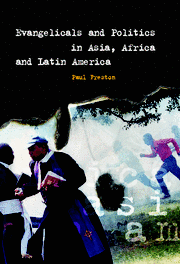Book contents
- Frontmatter
- Contents
- Foreword by David Martin
- Acknowledgements
- List of abbreviations
- Introduction
- PART ONE BRAZIL
- PART TWO ASIA
- PART THREE AFRICA
- 9 Sudan
- 10 Angola
- 11 Mozambique
- 12 Zimbabwe
- 13 Malawi
- 14 Rwanda
- 15 Uganda
- 16 Ghana
- 17 Kenya
- 18 Zambia
- 19 South Africa
- 20 Nigeria
- PART FOUR SPANISH-SPEAKING LATIN AMERICA
- Conclusion
- Bibliography
- Index
- Frontmatter
- Contents
- Foreword by David Martin
- Acknowledgements
- List of abbreviations
- Introduction
- PART ONE BRAZIL
- PART TWO ASIA
- PART THREE AFRICA
- 9 Sudan
- 10 Angola
- 11 Mozambique
- 12 Zimbabwe
- 13 Malawi
- 14 Rwanda
- 15 Uganda
- 16 Ghana
- 17 Kenya
- 18 Zambia
- 19 South Africa
- 20 Nigeria
- PART FOUR SPANISH-SPEAKING LATIN AMERICA
- Conclusion
- Bibliography
- Index
Summary
Zambia is central to the study of evangelicals in politics, because it has a charismatic evangelical president who has brought public visibility to his faith. It is thus a laboratory for studying some typical tendencies in a certain kind of evangelical politics in action in highly favourable circumstances.
Northern Rhodesia became independent in 1964 under Kenneth Kaunda, a former lay preacher of the African Methodist Episcopal Church. His UNIP became the only legal party in 1971. The copper mines (which earned 80 per cent of foreign exchange) were nationalised in the late 1960s, making the state the largest employer in the formal economy. Soon after independence, Presbyterians, Methodists and Paris Mission joined to form the United Church of Zambia (UCZ). This corresponded to Kaunda's call to overcome imported denominations; to the political ‘One Zambia, One Nation’, the religious ‘One Church’ should correspond. Desire for ecclesiastical unity was thus mixed with desire to please the new state. The government certainly did not want a plethora of autonomous religious groups (the buzzing civil society which Tocqueville saw as the seed-bed of American democracy), especially in a land that had seen strong anti-statist groups during the colonial period, such as the Watchtower and Alice Lenshina's millenarian movement. The UCZ has at times been almost an established church; in 1980 the synod noted that ‘most people in Parliament belong to the UCZ’ (Baur 1994: 433). It is described by Johnstone (1993) as having a ‘growing evangelical witness’.
- Type
- Chapter
- Information
- Evangelicals and Politics in Asia, Africa and Latin America , pp. 154 - 164Publisher: Cambridge University PressPrint publication year: 2001



